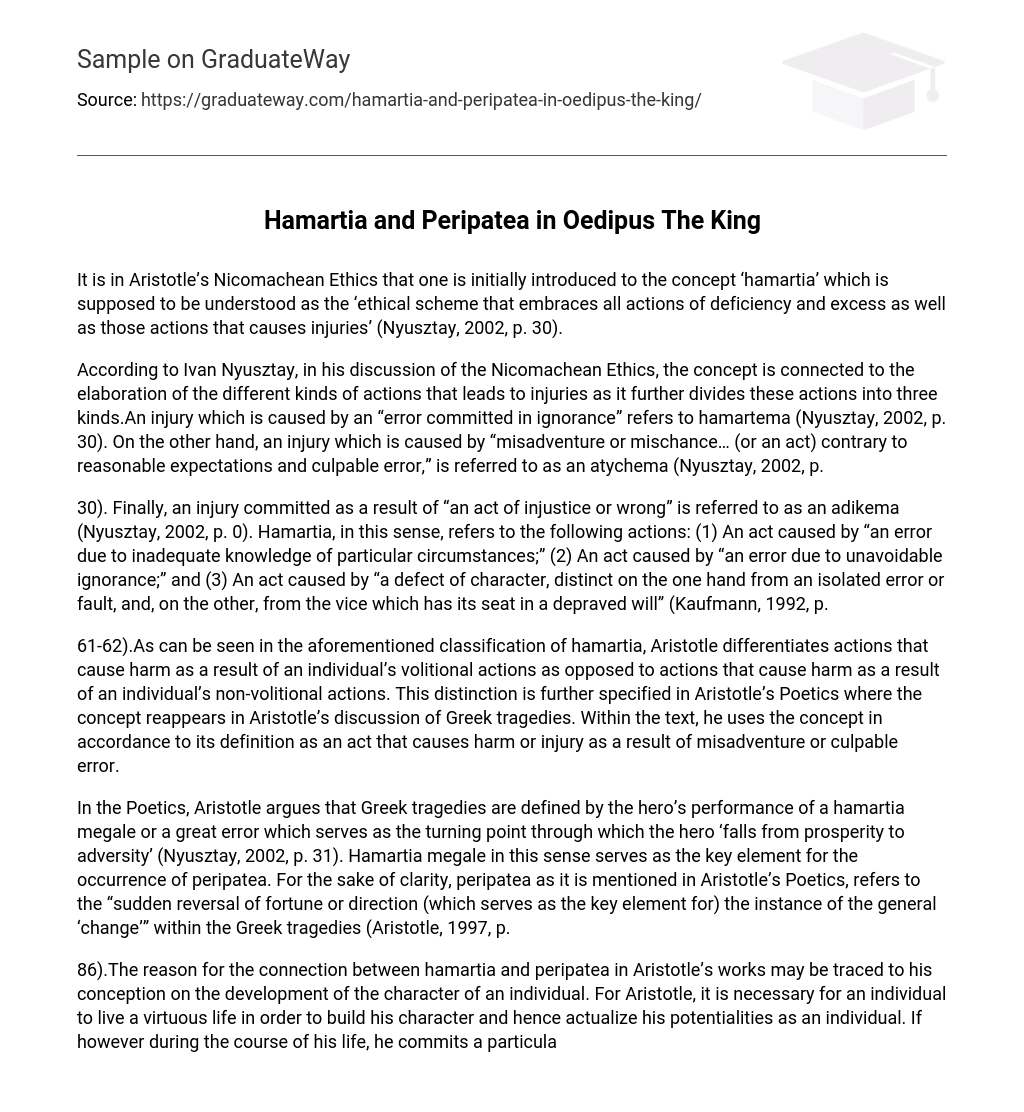It is in Aristotle’s Nicomachean Ethics that one is initially introduced to the concept ‘hamartia’ which is supposed to be understood as the ‘ethical scheme that embraces all actions of deficiency and excess as well as those actions that causes injuries’ (Nyusztay, 2002, p. 30).
According to Ivan Nyusztay, in his discussion of the Nicomachean Ethics, the concept is connected to the elaboration of the different kinds of actions that leads to injuries as it further divides these actions into three kinds.An injury which is caused by an “error committed in ignorance” refers to hamartema (Nyusztay, 2002, p. 30). On the other hand, an injury which is caused by “misadventure or mischance… (or an act) contrary to reasonable expectations and culpable error,” is referred to as an atychema (Nyusztay, 2002, p.
30). Finally, an injury committed as a result of “an act of injustice or wrong” is referred to as an adikema (Nyusztay, 2002, p. 0). Hamartia, in this sense, refers to the following actions: (1) An act caused by “an error due to inadequate knowledge of particular circumstances;” (2) An act caused by “an error due to unavoidable ignorance;” and (3) An act caused by “a defect of character, distinct on the one hand from an isolated error or fault, and, on the other, from the vice which has its seat in a depraved will” (Kaufmann, 1992, p.
61-62).As can be seen in the aforementioned classification of hamartia, Aristotle differentiates actions that cause harm as a result of an individual’s volitional actions as opposed to actions that cause harm as a result of an individual’s non-volitional actions. This distinction is further specified in Aristotle’s Poetics where the concept reappears in Aristotle’s discussion of Greek tragedies. Within the text, he uses the concept in accordance to its definition as an act that causes harm or injury as a result of misadventure or culpable error.
In the Poetics, Aristotle argues that Greek tragedies are defined by the hero’s performance of a hamartia megale or a great error which serves as the turning point through which the hero ‘falls from prosperity to adversity’ (Nyusztay, 2002, p. 31). Hamartia megale in this sense serves as the key element for the occurrence of peripatea. For the sake of clarity, peripatea as it is mentioned in Aristotle’s Poetics, refers to the “sudden reversal of fortune or direction (which serves as the key element for) the instance of the general ‘change’” within the Greek tragedies (Aristotle, 1997, p.
86).The reason for the connection between hamartia and peripatea in Aristotle’s works may be traced to his conception on the development of the character of an individual. For Aristotle, it is necessary for an individual to live a virtuous life in order to build his character and hence actualize his potentialities as an individual. If however during the course of his life, he commits a particular mistake, whether voluntary or involuntary in character, the individual has lost his virtue and it may only be regained through the initial realization of the mistake that has been committed and later on an adherence to the path of the virtuous life.
Hamartia thereby leads to peripatea since the former serves as the prerequisite for the occurrence of the later to the extent that the occurrence of the former will always lead to the occurrence of the later. This is particularly evident in the context of Sophocles’ Oedipus the King. Sophocles’ Oedipus the King presents the tragic events in the life of Oedipus whose fate was determined for him even from the initial period of his life.The peripatic event occurred within the text as the old man who was supposed to free Oedipus from his concerns regarding his relationship with his mother, ends up affirming Oedipus’ concern.
Aristotle states that this episode in Oedipus the King, “where the person comes to bring Oedipus happiness and intends to free him from his fear about his mother… (leads to) the production of an opposite effect as he reveals Oedipus’ identity” presents the reader with an example of a peripatic event within a text (1996, p. 135).The aforementioned event may be considered as a peripatic event which is connected to hamartia megale for the following reasons: (1) The event precedes Oedipus’ attainment of fortune which is evident in his acquisition of his father’s throne as well as his acquisition of his mother’s love; (2) This attainment of both his father’s throne as well as his mothers love was enabled by two events that are characterized by Oedipus’ performance of hamartia megale. The initial performance of hamartia megale is evident as Oedipus killed his father whereas the later performance of hamartia megale is evident as Oedipus wed and bedded his mother.
It is interesting to note that the peripatic event within the text occurred as a result of Oedipus’ desire to affirm that he has made the right act. By constructing the Greek tragedy in such a way that the ‘wrong action’ is revealed through the individual’s desire to affirm his virtue, the Greek tragedy was thereby able to show that tragedy occurs as a result of an individual’s adherence to a false virtue which is the case in the character of Oedipus in Sophocles’ Oedipus the King.





